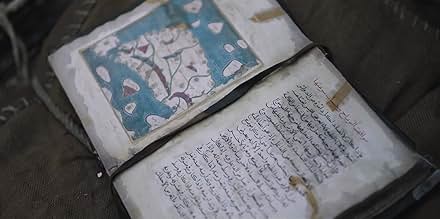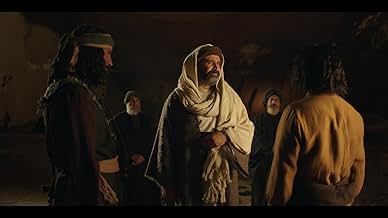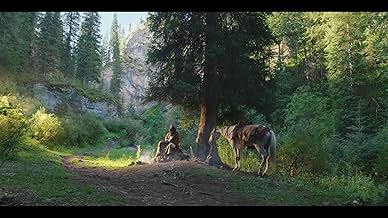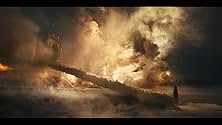IMDb-BEWERTUNG
7,4/10
2981
IHRE BEWERTUNG
Das 11. Jahrhundert und das Auftauchen des Anführers der Gruppe El Hashaashun, Hassan Al SabahDas 11. Jahrhundert und das Auftauchen des Anführers der Gruppe El Hashaashun, Hassan Al SabahDas 11. Jahrhundert und das Auftauchen des Anführers der Gruppe El Hashaashun, Hassan Al Sabah
Folgen durchsuchen
Empfohlene Bewertungen
To be honest, the first two episodes are quite interesting and attracts your attention. I think this could be a turning point in Egyptian drama industry as it's the first time i see that big investment in many aspects from graphics to clothes and accessories. Regarding the direction , i can see fascinating camera shots and good angles . The cast performance is satisfying so far even the little kids in the first episodes acted well . I can capture the 11th century vibes through the good direction and the cast performance. I liked the background music in many scenes as it's quite impressive although i didn't like the intro song as i didn't find the lyrics catchy, the intro also was excessive in using the choir and the song doesn't give an authentic vibe in terms of music.
I don't want to raise my expectations now , but i hope the series would be as good as the start and even better .
I don't want to raise my expectations now , but i hope the series would be as good as the start and even better .
Although Hasan Sabah was considered a controversial leader by many Muslims, he was undoubtedly a patriot who endeavored to undermine the Seljuks and Arabs in an effort to revitalize the Iranian empire. On the other hand, Hamid al-Ghazali, a devout Muslim, was strongly opposed to secular knowledge and philosophy, which led him to advocate against the spread of philosophical teachings among Muslims.
Moreover, there is a significant error concerning the supposed friendship between Khayyam, Hasan Sabah, and Nizam al-Mulk. Historically, Hasan Sabah was 17 years younger than Khayyam, and Khayyam was 21 years younger than Nizam al-Mulk, making it highly unlikely that these three dignitaries could have had a friendship.
Although the series is well-directed and cities like Samarkand and Isfahan are depicted beautifully, portraying Hasan Sabah as a villain does not seem fair.
Finally, I hope that someday a movie will truly portray Hasan Sabah accurately.
Moreover, there is a significant error concerning the supposed friendship between Khayyam, Hasan Sabah, and Nizam al-Mulk. Historically, Hasan Sabah was 17 years younger than Khayyam, and Khayyam was 21 years younger than Nizam al-Mulk, making it highly unlikely that these three dignitaries could have had a friendship.
Although the series is well-directed and cities like Samarkand and Isfahan are depicted beautifully, portraying Hasan Sabah as a villain does not seem fair.
Finally, I hope that someday a movie will truly portray Hasan Sabah accurately.
In fact, it is the first Arabic series or movie that I have seen, so the series is very acceptable for the country of Egypt in terms of narrative and history (apart from how close it is to reality) and it gets high marks, although I think that many of the images and the way of showing the events He copied movies and series such as Vikings, Lord of the Rings, and Game of Thrones, which of course gives a good feeling because these series and movies are very popular. In general, in my opinion, due to the high budget, airing time and narration of this series, it is completely political and purposefully tries to attribute it to the conditions of Iran and Shia and proxy groups.
This series is historically wrong and has betrayed history, the sorcerer woman and the rope and the choice of darkness are so ridiculous that there is no need for an explanation, but the covenant of the three friends between Omar Khayyam, Hassan Sabah and Nizam al-Mulk is nothing more than a legend, considering Their age difference is completely impossible, and their age difference is the most important factor, on the other hand, Malik Shah is presented as a wild and irresponsible person, while he was a just king who was betrayed by his uncle who marched against him at the beginning of the first reign. And then continued his father's expansion of the country, and during his time, Iran under the rule of the Seljuqs reached its greatest state during the Seljuk period. He was very interested in literature, poetry, science and philosophy, and this can be understood from the choice of Nizam al-Mulk as a minister, during his time, beautiful and extraordinary buildings were built in Iran, especially in cities like Isfahan, which are still in existence. As for Hasan Sabah, he took a path that he believed in. In his opinion, he was fighting for God and justice, and he was tormented by the division of lands and oppression of ordinary people, and he helped them a lot, although with harsh and many methods. Places of palaces and. The clothes in the series were more similar to Arabs, and this series was devoid of Iranian cultural elements, and the fact that the Selhouqians were the rulers of Iran and most of these coincidences do not happen in Iran, but except for a few times when someone says that they came from Persia, there is no mention of the issue. O Iran, that the Seljuqs ruled Iran and that Iran was united at that time, and most of these events happened within the borders of Iran at that time, many of which were part of Iran until two hundred years ago when Britain separated it to invent new countries. They were in Iran, and between the Khawarij and Daesh, he considers the Ismaili and Hassan Sabah terrorist groups to be the worst of all, for not paying attention to historical events. Not paying attention to Iran and Iranian culture, and not mentioning that the Seljuks and even Hassan Sabah were involved in Iran, and considering that the series even refused to mention that it changed some facts for more drama, I have to give points for these reasons. Reduce.
First of all, I would like to thank the Egyptian crew who made this series. This should indeed have been made by Iranians, but our government is too busy with its corruption that Iran's history has the least importance, so we should be grateful that this series was made.
It is crucial to address the false claims made by some Iranians regarding this series. They argue that Hasan Sabbah is portrayed as an Arab, but it is clear that the actors identify themselves as Persians. It is essential to understand that during the time Iran was ruled by Arab rulers, people had converted to Islam, and most spoke Arabic as well as Parsi language. Hence, it is evident that the show accurately depicts the historical context of the period. Furthermore, the claim that Sabbah was against Islam is entirely baseless as he was a devout Muslim himself. Those who make such unfounded assertions should watch the series with an open mind and refrain from spreading misinformation.
It's important to remember that Khayyam's religious beliefs have been a subject of debate, but some have claimed that he was not a Muslim, he was though maybe not a practicing one and in one of the episodes, Sabbah himself stated that Khayyam will always live with doubt, just as he did, and challenged God and his justice in his poems.
Having watched the four episodes myself, I can confidently say that they haven't shown anything that insults us Iranians or our history..
As an Iranian, it's time to face the reality that our culture is not what it used to be 2500 years ago. We have been under Islamic rule for centuries now, and it has transformed us to be like any other Middle Eastern country. While we may not speak Arabic, the similarities are far more than the differences. It's time to accept this fact, if you don't like it, then change yourself first.
It is crucial to address the false claims made by some Iranians regarding this series. They argue that Hasan Sabbah is portrayed as an Arab, but it is clear that the actors identify themselves as Persians. It is essential to understand that during the time Iran was ruled by Arab rulers, people had converted to Islam, and most spoke Arabic as well as Parsi language. Hence, it is evident that the show accurately depicts the historical context of the period. Furthermore, the claim that Sabbah was against Islam is entirely baseless as he was a devout Muslim himself. Those who make such unfounded assertions should watch the series with an open mind and refrain from spreading misinformation.
It's important to remember that Khayyam's religious beliefs have been a subject of debate, but some have claimed that he was not a Muslim, he was though maybe not a practicing one and in one of the episodes, Sabbah himself stated that Khayyam will always live with doubt, just as he did, and challenged God and his justice in his poems.
Having watched the four episodes myself, I can confidently say that they haven't shown anything that insults us Iranians or our history..
As an Iranian, it's time to face the reality that our culture is not what it used to be 2500 years ago. We have been under Islamic rule for centuries now, and it has transformed us to be like any other Middle Eastern country. While we may not speak Arabic, the similarities are far more than the differences. It's time to accept this fact, if you don't like it, then change yourself first.
Top-Auswahl
Melde dich zum Bewerten an und greife auf die Watchlist für personalisierte Empfehlungen zu.
Details
- Erscheinungsdatum
- Herkunftsland
- Offizieller Standort
- Sprache
- Auch bekannt als
- El Hashaashun
- Weitere beteiligte Unternehmen bei IMDbPro anzeigen
- Farbe
Zu dieser Seite beitragen
Bearbeitung vorschlagen oder fehlenden Inhalt hinzufügen





















